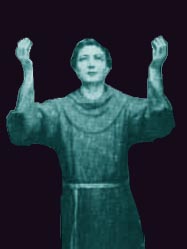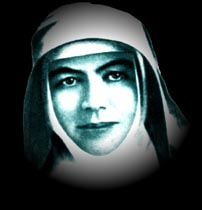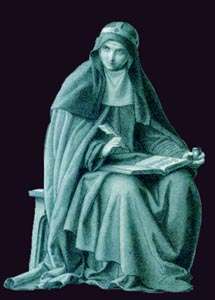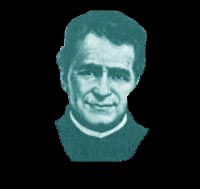|
|
|

|
Saint Francis of Assisi (1181-1226) Praised be my Lord and God, with all His creatures, and especially our brother the sun, who brings us the day and brings us the light; fair is he, and he shines with great splendor. O Lord, he is a sign to us of you! Praised be my Lord for our sister the moon, and for the stars, set clear and lovely in the heaven. His feast day is on 4 October. |

|
Saint Patrick (c387-c464) Christ shield me this day: Christ with me, Christ before me, Christ behind me, Christ in me, Christ beneath me, Christ above me, Christ on my right, Christ on my left, Christ when I lie down, Christ when I arise, Christ in the heart of every person who thinks of me, Christ in every eye that sees me, Christ in the ear that hears me. His feast day is on 17 March. |

|
Saint Colman ( -676) Colman became the third abbot-bishop of Lindisfarne in 661. Like them, he had come from Ireland to become a monk at lona, and he wholly favoured Celtic customs in such matters as the dating of Easter and the tonsure of monks. He had the support of Oswy, king of Northumbria, but Oswy's queen, Enfleda, came from Essex and favoured the Roman Church's practices. In 664 Oswy summoned the Synod of Whitby to decide the issues. Colman was defeated in debate by Saint Wilfrid of Ripon and resigned. He returned to lona, accompanied by his Irish monks and by thirty English monks, but then decided to settle in Ireland. Divisions soon appeared at the new monastery on Inishbofin, an island off the coast of County Galway. The English monks complained that the Irish visited the mainland in summer, leaving them to bring in the harvest alone. Colman solved the problem by establishing a new foundation for the English monks on the mainland. He died on Inishbofin in 676. |

|
Saint Paschal Baylon (1540-1592) Paschal was the son of farmers Martin Baylon and Elizabeth Jubera. From youth he displayed great devotion to the Eucharist. He worked on the farm until the age of 24. He then became a Franciscan brother, often serving as a cook and answering the door to visitors. He was noted for his kindness to the poor and for his unfailing courtesy. His feast day is on 17 May. |

|
Blessed Mary MacKillop (1842-1909) She was born in Australia to poor Scottish emigrants. She faced opposition from church officials for her social ideas, and refused to let a bishop take control of her order. In 1871 she was excommunicated due to these disputes. Her feast day is on 8 August. |

|
Saint Columcille (521-597) He was the son of Fedhlimidh and Eithne of the Ui Neill clan of Irish royalty. He was both a priest and a traditional Celtic bard, who worked as an itinerant preacher and teacher throughout Ireland. He was exiled to Iona, and founded and led a monastic community there for 12 years. He and the monks of Iona then evangelized the Picts. His feast day is on 9 June. |

|
Saint Bridget (453-523) Her father was a pagan Scottish King of Leinster and her mother, Brocca, a Christian Pictish slave who had been baptized by Saint Patrick. Just before Brigid's birth, her mother was sold as a slave to a Druid landowner. Bridget worked as a dairy maid before becaming a nun. I would like the angels of Heaven to be among us. I would like an abundance of peace. I would like cheerfulness to preside over all. I would like Jesus to be present. I would like the friends of Heaven to be gathered around us. I would like a great lake of beer for the King of Kings. I would like to be watching Heaven's family drinking it through all eternity. Her feast day is on 1 February. |

|
Saint John Bosco (1815-1888) He worked as a farmer, tailor, baker, shoemaker, and carpenter while attending school and the seminary. Then he became a teacher and founded the Salesians. It is easier to become angry than to restrain oneself, and to threaten children than to persuade them. Let us be ashamed to assume an attitude of superiority. Let us not rule over them. His feast day is on 31 January. |

|
Saint Francis Xavier (1506-1552) What is the connection with Coromandel? Very little! Except that the fishing coast of India where St Francis ministered was called the Coromandel! It is not the actual physical exertion that counts towards a person's progress, nor the nature of the task, but by the spirit of faith with which it is undertaken. His feast day is on 3 December. |